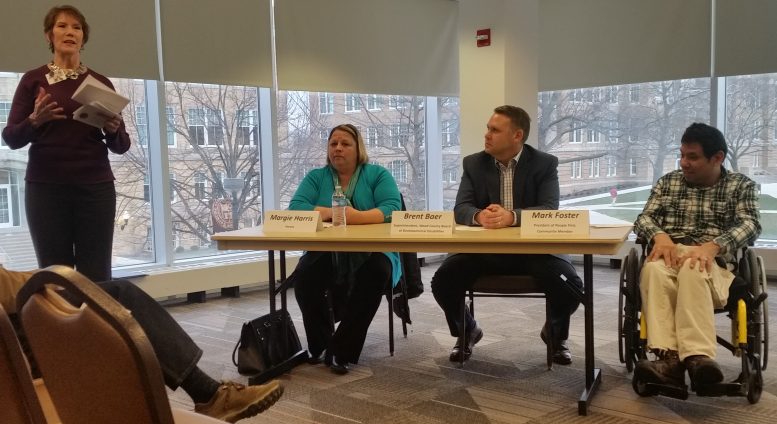By JAN LARSON McLAUGHLIN
BG Independent News
Wood Lane is asking voters to approve a reduced renewal levy – dropped from the current 2.95-mills to 2.45 mills.
The decrease in millage allows the agency to be fiscally responsible and continue to provide quality services, according to Wood Lane Superintendent Brent Baer.
Wood Lane has been required by Medicare/Medicaid rules to shift its services to private providers in the past few years. So some question why the Wood County Board of Developmental Disabilities needs a levy on the ballot.
The reason – while Wood Lane no longer provides the services directly, it now has to pay private agencies for the services.
Privatization did result in some reduced costs for the Wood County Board of Developmental Disabilities. And the board did pass those savings on to the taxpayers, Baer said.
For example, in 2017 the board eliminated its levy collection all together, and in 2018 it collected 50 percent of the millage.
But while there have been some cost savings by privatizing services, there are some cost increases due to growing demands for services, Baer said.
Since 2013, the individuals served by the Wood County Board of Developmental Disabilities has grown from 899 to 1,071.
“None of the individuals who previously received services stopped receiving services,” Baer said. “Our commitments are for the life of an individual.”
When people with developmental disabilities waive their right to institutional care, they are picked up by community based services – like Wood Lane. That agency then identifies their needs and develops plans to meet them, Baer said.
The waivers allow for federal funding, but the community agency must still pick up 40 percent of the costs, said finance officer Steve Foster.
Demands are growing as the population here is increasing. “Wood County is one of the few counties in Ohio that’s growing,” Baer said.
Wood Lane services start early and follow people throughout their lives.
“We start at birth with early intervention services,” he said.
More early intervention is needed for children with autism, and for children affected by the opioid crisis, he added.
As the children age, Wood Lane School gets involved for youth up to the age of 22.
“Anyone who runs a school for people who have significant developmental disabilities has additional costs,” Baer explained.
But Wood Lane has no intention of not offering school services. Without them, children would be placed back in their home schools – which would just shift the costs to those districts. Or they would be cared for at home, where little socialization is offered.
“We just can’t let that happen,” he said.
The agency also offers Family Support Services such as respite care, help with home modifications, and special diet assistance.
“It’s a bit of a lifeline between the county board and those who receive services,” Baer said.
Requests for those services are also growing.
The agency provides homemaker care, transportation to work and medical services, plus vocational services.
One of the big challenges is to find safe, affordable and accessible housing for their consumers.
“We continue to be overwhelmed by housing needs,” Baer said.
One of the newest specialized programs for Wood Lane was the opening of a home for children with developmental disabilities. Baer said he is very proud of that program that kept children from having to move to other counties.
“We were able to intervene in a situation where people were in desperate need of residential services.”
Baer explained that the board works hard to bring in matching funds for services provided.
“We work diligently to draw down housing dollars from the outside.”





